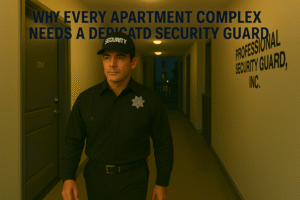Do you want to know the types of training for security guards? Having a security guard on your office or business premises has become the most basic of needs in today’s world. Security guards protect the employees and the customers and help keep robbers, thieves, and shoplifters at bay. The security guards must know basic security training and advanced techniques to perform these tasks.
Now, as far as the types of training for security guards are concerned, there are quite a few, and the guard must go through them. This approach ensures the guards understand their roles and what is expected of them in emergencies.
Some training of the guards is done on the job site and includes different regiments to familiarize the guards with the ins and outs of the site. The guards undergo other training in specific academies, many of which are also based around the San Deigo.
Types Of Training For Security Guards
The security guards must take the following types of training based on their skills and job description:
- Basic security officer training
- General security guard training
- OHS training
- Internal training
- On-The-Job Training
- Cross Training For Security Guards
The first three types of training are essential for all security guards. Internal training, on-the-job training, and cross-training are offered only to specific guards depending on the needs of the company or on the type of job.
Basic Security Officer Training
Basic security officer training is the first step in the journey of the security guards. Offered in professional training academies, it focuses on enabling the guards to develop professional ethics, learn personal safety, and get the idea of the basics of legal studies.
Training security guards who are still in the academy are not qualified to offer professional services until they have completed the said training and have performed well in the after-training tests.
Here’s a short Youtube video explaining the basic security officer training.
General Security Guard Training
The next step in the training tenure of the security guards is the general security guard training or GST in which the trainees undergo different pieces of training designed to make them suitable for a required job.
The guards are awarded certificates and credit hours upon the completion of a specific training regime. Some of the trainings offered in this category are:
- Self-defence
- Traffic control
- CCTV camera control room
- Operation rooms management
Occupational Health and Security (OHS)
In the next step, the security officers undergo OHS training which allows them to keep a check and balance on the overall safety of the company and its employees.
OHS training is specifically designed to make the security guards capable of tackling different emergency situations and prevent any unfortunate incidents that may befall the company’s employees or the general public in said situations. The guards also learn to handle various legal aspects of the company’s security in these situations.
During this type of training, the guards become familiar with the following procedures:
- First Aid
- Fire prevention
- Safety evacuation
- On-site health and safety maintenance
Internal Training
After the guards have taken the three basic initial trainings, they are ready to be hired. But some companies might also require the guards to learn from the company’s own supervisors to get acquainted with the ins and outs of the on-site job.
This type of training, which is offered by the company, using its own teachers, time, money, and other resources, is known as internal training.
The company’s employees might also involve themselves in the training to create a proper learning environment for the guards.
Internal training by the company can be very beneficial for guards as they can become familiar with the work environment of the company and the company also gets to test the potential and the performance of different guards. Several other benefits of this internal training include:
- Providing personalized training according to the company’s needs ensures meeting all requirements in the best possible way.
- The training routines are easily customizable and the company can change the routine of specific guards to allow them to work different on-site jobs.
- Since the company’s employees and training staff directly interact with the guards, communication between the two parties improves greatly.
Certifications For Internal Training
Just like any other type of training, the security guards are also awarded credit hours and certificates upon completing the internal training.
In many cases, the responsibility of providing the security guards with specific certifications rests on the shoulder of the company itself.
In addition, to fulfill this responsibility, the company can have a designated training department, which trains and tests the guards. Some companies also outsource and give the task to other certified training facilities involved with the company.
The company’s linkage to the training facility must be assured in this case as the company is trying to get the guards used to its routines and work areas.
You must also be wondering about the institutions which can give the certificates to the security guards for the internal training programs. These awarding institutions vary according to each type of internal training.
Moreover, many of these are linked with the hiring companies to check the training progress and award the certificates only to the succeeding candidates. Some well-known awarding institutes include G4S, Allied Universal, and HSS.
The program includes certificates awarded after internal training because the guards receive them only after training under the company’s supervision.
Furthermore, this means that these certificates can only be awarded to the guards the company selects for work.
These certificates show that a guard is qualified for the said job and he can also use these certificates to help him with their future job applications. Security Officers must also be aware of the duties and responsibilities of security guards to perform their job well.
Some of the most essential certifications include are given below. We have listed these certifications because they are among some of the most in-demand ones, and the chances of the security guards getting future jobs with the help of these certifications are increased manyfold.
- Internal Communication
- Cash in transit
- Hotel security
- Bank security
- Sports facility management
Internal Communication
To ensure proper communication between various security guards and between the guards and the company personnel, several companies, such as hotel security providers, VIP security companies, shopping malls, and banks can subject the guards to a communications training program.
The training and the scrutiny period can vary according to the time duration the company decides. After the required time, a certificate and credit hours associated with the training are awarded to the trainees.
The guards can get the certificate for internal communication from the hiring company itself and from third-party sources like eCornell, associated with the company.
Cash In Transit
If a company involved in transferring or receiving large amounts of cash hires security guards, it also trains the guards to carry out these transit operations.
The trainees learn according to the security standards set by the law and the company’s needs. After the completion, the trainees get a certificate and can use it in their cover letters.
The guards can get this certificate from the hiring company or other sources linked with the company like NSI.
Hotel Security
Since hotels deal with a large number of people than other businesses, their security is very paramount. The guards receive the required training according to the hotel standards and strive to protect the hotel from any internal or foreign threat. Upon completion, the guard receives a certificate and credit hours, which they can add to their CVs.
Most hotels have their own training departments and the guards can get this certificate from the said department.
Bank Security
Due to the high cash amounts stored in them. The banks devise rigorous training routines for their security guards.
Furthermore, this enables them to protect the lives of the bank employees and the valuable public assets stored in the banks. In addition to the experience, the trainees get credit hours and certificates once they complete the training.
Since the security of banks calls for an extensive set of skills, the banks mostly choose to train the guards themselves using their specific in-house training programs and award them their own certificates.
Sports Facility Management
Sports facilities and other entertainment centers see many people during the sports seasons. Thus the guards protecting these facilities are subjected to about two weeks of standardized training to help them deal with unwelcome conditions. A certificate and training hours are awarded at completion.
Many sports companies are linked with third-party training providers, like the Johan Cruyff Institute which give certifications to the guards. Some facilities can also train the guards in-house and offer their own certificates.
On-the-Job Training
On-the-job training(OJT)involves training security guards in an environment they will counter daily during the job. In addition, it can be done on the job site or in a job-simulated environment.
So, it is the most significant component of the security guards’ training as they can practically learn from it under a supervisor. It just gives them a clear idea of how to perform their duty. Instead of making them watch some footage or presentations, giving them a real-life environment boosts their capabilities, and better prepares them for the job.
Now the question arises ‘How many hours should you spend on the job training?’ These may vary depending upon the skills and awareness of the guards, but a 16-hour training regime for security guards is a standard.
List Of Different On-The-Job Training
The following topics should be part of the security guard training routines:
- Technical equipment handling
- Hazmat training
- Code of conduct
- Emergency procedures training
Technical Equipment Training
On-the-job training must include a technical equipment training program, one of the major types of training for security guards, that should focus on training the guards about using specialized equipment like CCTV cameras, phone systems, and alarm panels.
In this digital era, these things are the critical component of any security plan. If the security guards cannot operate them, they are not utilizing the technology to their full advantage. It will lead to the site’s security loopholes, compromising the assets there.
Furthermore, the certificate awarded to the security guards after completing this training shows their eligibility to handle all types of technical equipment. Security companies like ESPA also give these certificates.
Hazmat Training
In case you are unaware, hazmat stands for hazardous material. So if you plan to provide security at a place that involves working with hazmat, you should have guards trained adequately to handle this material as it requires being vigilant at the site.
Companies like Hazmat School offer this training and the completion certificate to the guards on completion of this training.
Code Of Conduct
A guard that is unaware of how to deal with his fellow guards or the employees is of no use even though he is quite capable of providing security. If someone lacks basic ethics and coordination, he is not advantageous for the company as he will disrupt the whole security system. So, it is essential to run a basic code of conduct training to remind the security guards about the basis of ethics.
Companies like the University of Compliance give training and a certificate for the code of conduct to qualified security guards.
Emergency Procedure Training
Emergency procedure training is a must as any emergency can arise at the job site, and the priority of security guards should be saving lives. He should be well aware of performing CPR and giving first aid.
Moreover, everyone should know how to use a fire extinguisher, as there may be a fire. These things, if once performed in the on-the-job training, remove the apprehension of the guards and create coordination.
NYMC, among many others, offers emergency management training and certificates to qualified guards.
Cross Training For Security Guards
Security guards should not be limited to the primary task of protection. In large corporations, security guards have to perform various tasks. So it is essential to train them to perform different activities as a person with multiple skills is always a plus point.
If security guards receive cross-training, their absence does not hinder activities even when a crucial person for that activity is unavailable.
They can also integrate with staff and other security personnel to perform some administrative functions in an emergency.
Testing as Part Of Security Guard Training
You may ignore the essential process of testing a trained security guard if you are not careful. Moreover, you should demand and have all the certifications of a guard that started working on your site.
These guards should also be re-evaluated regularly, like every six months or annually. Additionally, it provides peace of mind, and the guards remain attentive to their job if evaluation is on their minds.
During these tests, the training body assesses some of the most essential skills of the guards. Only through these skills can the guards perform their duties the best and we can trust them to get out of tricky situations without any setbacks.
FAQs
What are the four kinds of security training?
Guards are provided training in four central departments. These are:
Physical training
Armed training
Unarmed training
Skills training
In addition, there can also be other types depending on the company’s needs.
What is the best training course for security guards?
There is not a single best option for guards. Popular training courses and certificates include:
Physical security
First aid training
Fire management and safety evacuation
Information security
What are the three categories of private security training?
These three types of private security training are:
1: Government-assigned security training
2: In-house security training
3: Temporary Contractual security training
Want To Hire The Best Trained Security Guards? Contact Us
Our guards, having undergone comprehensive training for various security scenarios, are well-equipped to work in any environment.
In addition, meeting all security standards, our guards have undergone rigorous training and diverse certificates and credit hours to help you secure your reputable business.




